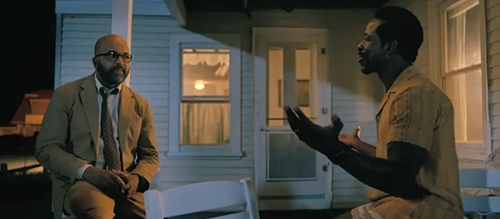
American Fiction (2023)
Director: Cord Jefferson
Screenwriter: Cord Jefferson
Starring: Jeffrey Wright, Issa Rae, Erika Alexander, Sterling K. Brown, Tracee Ellis Ross, John Ortiz
Cord Jefferson’s American Fiction plays like a novel. It drifts from the sandy homes of coastal Massachusetts to the slimy center of the LA literary scene like a changing breeze. Witty banter about race in literature is intercut with family drama and a compelling budding romance. It leans heavily on the intensity of its dialogue and is supported by a stunning lead ensemble. Based on Percival Everett’s 2001 novel, “Erasure“, the film carries the weighty expectation of adapting a challenging and precise satire for modern race conversations despite the twenty years that separate the works.
We meet Thelonious “Monk” Ellison (Jeffrey Wright) as an established but struggling Black writer who wants the kind of commercial success found by his peer, Sintara Golden (Issa Rae), and her novel “We Lives in Da Ghetto”. Monk, who is named after the Black composer and pianist by the same name, is deeply committed to his craft and wants to be taken seriously as an artist. As he is forced to travel from LA to Massachusetts, we meet the rest of his family. His mother struggles with the early stages of Alzheimer’s, and both his sister and brother are going through messy divorces. Financial and emotional pressures mount, and Monk gets an idea: an F you to the publishing industry. He writes a book so stereotypical, so “Black”, that he believes he will be laughed out of every publishing house in the city. And, of course, for the first time in his career, he has written a smash success.
The film is largely marketed on this premise. A Black author becomes famous under a caricature of an identity. Monk, indeed, does masquerade as a felon by the name Stagg R. Leigh who swears at publishers and is encouraged to dress “street” (jeans and a t-shirt, apparently) by his agent. It’s a clever idea fraught with real-world conflict. Monk navigates Black identity, the White gaze, and the publishing industry all within his individual quest to write great books. This would’ve been enough. But what surrounds the story is what makes American Fiction so layered, so literary, and so special.
Case in point, cue the rom-com Gods: right as Monk unpacks his life in front of the family beach house, in rolls his love interest, the quirky, kind, gregarious Coraline (Erika Alexander). Armed with a wardrobe of cascading camisoles and floppy sunhats, Coraline shines a bright ease into Monk’s life – though she’s not afraid to challenge him. Erika Alexander breathes life into this role. Though she’s written to give depth to Monk’s troubled character, she refuses to be flattened. Through her subtle choices as an actress, we see a sketch of a woman who is smart, content, and yet always growing in her outlook and her relationships. Alexander and Wright spark instant chemistry; enough to fill out the world sans publishing industry drama.

Equally charming, but perhaps ten times more intense, are Monk’s siblings Cliff (Sterling K. Brown) and Lisa (Tracee Ellis Ross). One of the film’s major faux pas is not giving Lisa more to do – surely we could have all benefitted from a little more of Ross’ signature humor. A bit more substantially, Cliff, Monk’s brother, has finally come into his identity as a gay man after a long relationship with a woman. We don’t see everything from Cliff’s life – swimming in the pool at midnight here, doing drugs with younger men there – but Sterling K. Brown is a certified scene stealer. If you know Brown from ‘This is Us’, his role as Cliff is a total treat. He’s funny, quick on his feet, and simultaneously heartbroken and bitter. He’s able to communicate nuance (a younger brother in distress is still a younger brother, after all) in a matter of a look. If nothing else, American Fiction is worth seeing for Brown’s performance.
Of course, all these pieces work in tandem to elevate the cultural discussion happening at the forefront of the film. Monk’s life is filled with complexity because life always will be. Discussions about race and art aren’t divorced from real life, as much as many critics wish they were. The film takes scathing shots at the literary award scene for pumped-up “diversity efforts” (one man straight up tells Monk he needs a diversity pick on the judging panel) while ignoring Black voices. Monk and Sintara Golden have an intense but thoughtful discussion on what it means to tell Black stories – especially Black stories that aren’t your own.
On the surface, American Fiction is a discussion about culture, literature. Then, if we dig a little bit deeper, it’s a rom-com, a family drama. It tells the story of a man in the middle of his career struggling to make sense of his art and his life. A story about finding love in the midst of grief. Then, if we dig even further, it’s all of these things. It’s culture, it’s race, it’s love, it’s everything. It’s Sterling K. Brown in tiny swim trunks on the porch of a beach house in Massachusetts.
Score: 20/24

